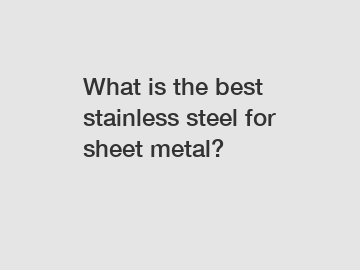Feb. 20, 2024
Hardware
When it comes to working with sheet metal, choosing the right material is crucial in ensuring the success of your project. One of the most popular materials for sheet metal fabrication is stainless steel due to its durability, strength, and corrosion resistance. However, not all stainless steels are created equal, and it's important to know which type is best suited for your specific needs.
There are many different grades of stainless steel available on the market, each with its own unique properties and characteristics. The three most commonly used grades for sheet metal fabrication are 304, 316, and 430 stainless steel. Each grade has its own advantages and disadvantages, so let's take a closer look at each one to determine which is the best choice for your project.
304 Stainless Steel:

304 stainless steel is the most commonly used grade for sheet metal fabrication. It is known for its excellent corrosion resistance, good weldability, and high strength. 304 stainless steel is also non-magnetic and is easy to clean, making it ideal for applications where hygiene is a concern.
One of the main advantages of using 304 stainless steel for sheet metal fabrication is its versatility. It can be easily formed, welded, and machined, making it suitable for a wide range of applications. Whether you are working on a small DIY project or a large industrial application, 304 stainless steel is a reliable choice.
However, 304 stainless steel may not be the best option for applications that require increased strength and corrosion resistance. If your project involves exposure to harsh chemicals or environments, you may want to consider using a different grade of stainless steel.
316 Stainless Steel:
316 stainless steel is another popular choice for sheet metal fabrication. It is known for its superior corrosion resistance, particularly in acidic environments. 316 stainless steel also has excellent strength and toughness, making it ideal for applications where high mechanical properties are required.
One of the main advantages of using 316 stainless steel is its resistance to pitting and crevice corrosion. This makes it suitable for applications in marine environments or where exposure to saltwater is a concern. 316 stainless steel is also non-magnetic and can be easily welded and machined.
While 316 stainless steel is more expensive than 304 stainless steel, its superior corrosion resistance makes it a worthwhile investment for applications where durability is a top priority. If you are looking for a material that can withstand harsh environments and corrosive chemicals, 316 stainless steel is the best choice for your project.
430 Stainless Steel:
430 stainless steel is a lower-grade option for sheet metal fabrication. While it is less expensive than 304 and 316 stainless steel, it does not offer the same level of corrosion resistance. 430 stainless steel is best suited for indoor applications where exposure to moisture and corrosive substances is minimal.
One of the main advantages of using 430 stainless steel is its high heat resistance. It is often used in household appliances such as refrigerators, ovens, and dishwashers due to its ability to withstand high temperatures. 430 stainless steel is also magnetic and can be easily formed, welded, and fabricated.
However, 430 stainless steel is not recommended for applications where corrosion resistance is a top priority. If your project involves exposure to moisture, chemicals, or saltwater, you may want to consider using a higher-grade stainless steel such as 304 or 316.
In conclusion, the best stainless steel for sheet metal fabrication ultimately depends on your specific needs and requirements. If you are looking for a versatile and cost-effective option, 304 stainless steel is a reliable choice. For applications that require superior corrosion resistance and mechanical properties, 316 stainless steel is the best option. If you are working on indoor applications where heat resistance is a concern, 430 stainless steel may be suitable for your project.
It's important to consult with a professional sheet metal fabricator to determine the best stainless steel grade for your specific application. By considering factors such as corrosion resistance, strength, and cost, you can choose the right material for your project and ensure its success.
The company is the world’s best etched stainless steel sheets grade 201, Decorative Stainless Steel C Profile Section, No.4 Stain Stainless Steel Sheets supplier. We are your one-stop shop for all needs. Our staff are highly-specialized and will help you find the product you need.
If you are interested in sending in a Guest Blogger Submission,welcome to write for us!
All Comments ( 0 )